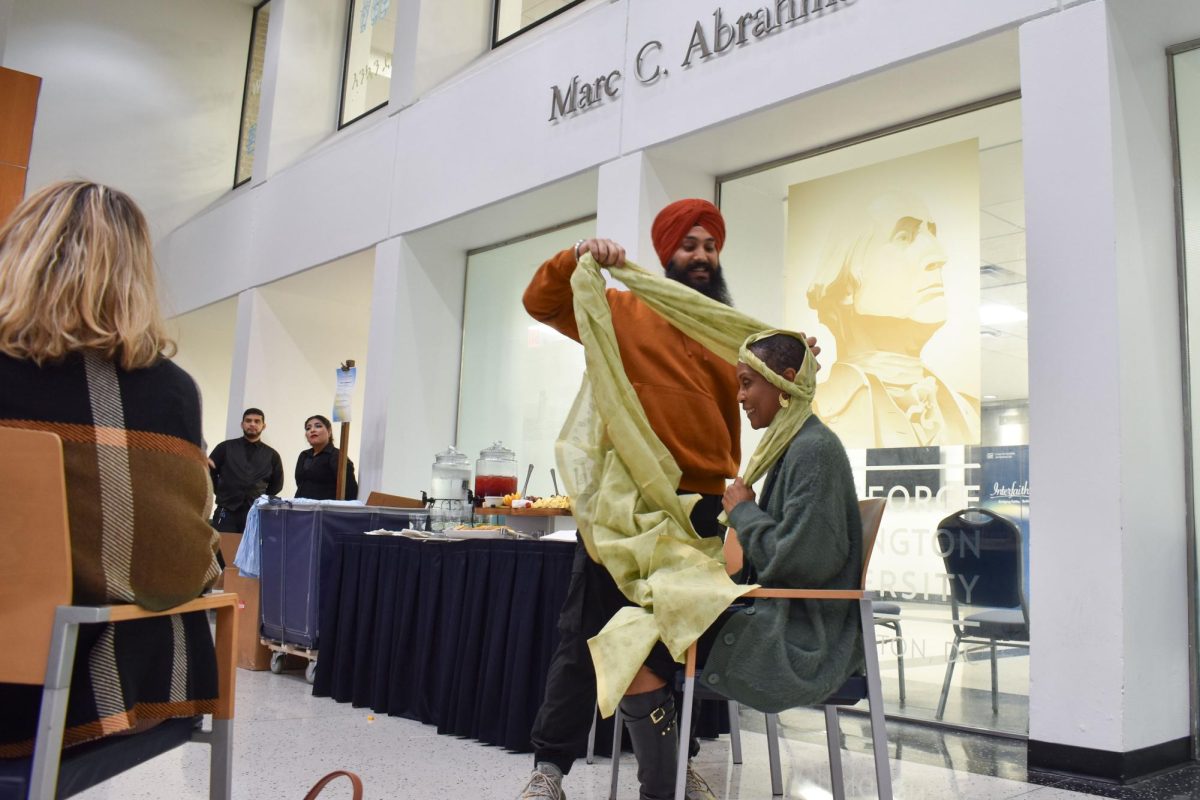Nestled at the bottom of the School of Media & Public Affairs’ weekly newsletter, under panel announcements and job opportunities, is a weekly column — View from the Loge.
During his first year as director of the School of Media & Public Affairs, Peter Loge has taken to the column to discuss his thoughts on the weekly events at GW and abroad. The column — filled with anecdotes from talks with students and turns of phrase like turning SMPA into an adjective, SMPAness — often deploys a community-focused lens, a cornerstone of his tenure in the school’s top role.
“We need to just constantly find ways to be better together,” Loge said. “And that doesn’t mean be happier together. It’s fun to challenge each other and be willing to be challenged, our politics or values or views of the world. Let’s continue to make each other better thinkers.”
Loge, who took over from professor Silvio Waisbord last July, said strengthening the school’s community, continuing to expand connections to the school both inside and outside of GW, and ensuring students are prepared for careers in journalism and political communication were some of his biggest goals when entering the role. He said SMPA has worked to build community through events like panels and a career fair this year.
Loge said the events SMPA hosts are a large part of building community both formally and informally. He said events the school hosts like the Sesno Series, a panel series with the organization Campaigns and Elections, and a career fair have been ways he has worked to form a community within the school.
“This year, we got a good start. Next year, we’re really gonna pick up steam,” Loge said.
SMPA hosted two Sesno Series events during the academic year featuring Sen. Cory Booker (D-NJ) and Gov. Spencer Cox (R-Utah). The school also hosted a career fair that featured employers like NBC News and communications firm BerlinRosen and partnered with Campaigns and Elections, a magazine about political campaigns, to host programs like panel discussions on artificial intelligence and campaigning and the future of political campaigns.
Loge said connecting and working with alumni is another growing aspect of SMPA’s identity. He said he has invited alumni back to speak on panels and teach classes such as Intro to Media Economics, taught by 2007 alum Jennifer Helm, a Shapiro fellow at SMPA, and Political Campaign Communication, taught by 2003 alum Oren Shur, a part of the “life” of SMPA.
“It’s a critical part of who we are and some of my favorite stuff,” Loge said. “I’ve been to three weddings of former students because we’re creating and building and fostering community.”
He said the school can use alumni to help raise money to make the school more affordable for students. Loge said the school offers scholarships like the Cokie and Steve Roberts SMPA Student Support Fund for students in financial emergencies and the SMPA Career Access Network for students working a low or unpaid internship.
“That’s on me to find alumni who have done well and say, ‘Hey, you are where you are because of what you did here at this weird, little corner of Foggy Bottom. Lend us a hand, if you can,’” Loge said.
Loge said SMPA needs to find a way to prepare students for a “rapidly changing” media landscape as the industry becomes more competitive with major news organizations like the Washington Post and NPR shrinking their staff, including putting an emphasis on a liberal arts background for students to “think critically and communicate clearly.”
When asked what percent of SMPA journalism major graduates would become journalists, Loge didn’t specify, but he said the school prepares students for careers in journalism more than “any other place in the country” because of internships, alumni connections and brown-bag meetings at the school. He added that not all journalism majors want to become journalists.
“Media is going to be here, we’re going to read stuff, we need journalists, we need producers and writers and editors, we need photographers,” Loge said. “What does that look like? I don’t know anybody knows, but the best thing we can teach you to do is you have to think critically and quickly and communicate clearly, you’re ready for whatever comes next.”
Loge said he thinks SMPA has a diverse faculty, but the school “can always do better” when hiring full-time faculty, specifically those who teach classes for the political communication major. Loge said it’s harder to hire diverse full-time faculty because the school needs to wait until an existing faculty member leaves, leading SMPA to focus its hiring efforts on adjunct faculty.
“I feel like our adjunct faculty is relatively diverse, and you can always do better with racial equity,” Loge said. “But, we are moving in a good direction because D.C. is full of really smart, interesting people, many of whom aren’t white guys.”
Loge said he is committed to increasing SMPA’s visibility to both D.C. high school students and those across the nation in order to attract more diverse students. He said he has had preliminary conversations with a “couple” of national organizations to connect the school with high school students with interests in politics and journalism and implement programs that include having professors speak at high schools and host students at SMPA.
In 2023, white students made up 66.6 percent of students in SMPA, with Hispanic students accounting for 11.1 percent, Asian students compromising 8.5 percent and Black students making up 5.28 percent of the school’s student population. The school’s population last year was 75.1 percent female and 24.9 percent male.
“There are a lot of really smart, really interesting people all over the country who want to tell, shape and make the stories that matter,” Loge said. “We have to make sure that all of them know we’re here and that we will do everything we can to make it so they can afford to be here and that they feel welcome here. It’s an ongoing challenge and one I’m really, really committed to.”
Jesse Holland Jr., the associate director of SMPA, said he and Loge have been able to “do a lot of good things” as the school’s director and associate director.
“I think we’re setting the groundwork for great successes in the future,” Holland said. “Of course, in the beginning, everything moves a little slowly as we get used to our new positions and figure out where everything is and which doors unlock and don’t lock, but I think as we get our feet under us, people can expect great things from SMPA.”





